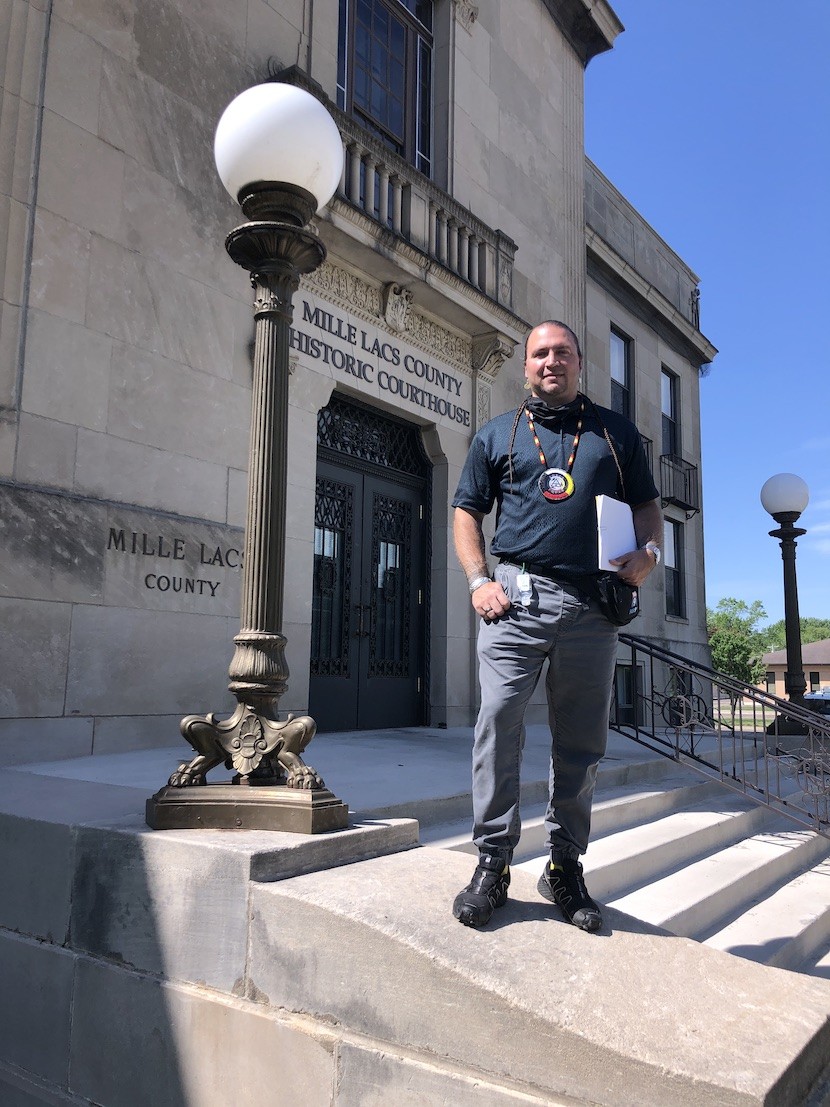
Mille Lacs Band members have served on township boards and school boards and have run for State Senate, but for the first time ever, one of our own is aiming for a seat at the table on the Mille Lacs County Board — a governmental body that has a history of antagonism toward the Mille Lacs Band.
Bradley E. Harrington, former Commissioner of Natural Resources for the Mille Lacs Band, put pen to paper on the steps of the Historic Courthouse in Milaca on June 2, as he filed office with a vow to serve all the people of northern Mille Lacs County — and with optimism about his chances.
“Even though the north end of the county has elected people who drove a wedge between us for many years, I believe that most people, Native and non-Native, are ready to move beyond controversy and division to work together for a better future,” said Bradley. “The Band is the county’s biggest employer and a good chunk of the population, so it just makes sense for the county to move in a different direction that would work with us, and I’d love to be part of that change.”
In 2016, the County Board voted 5-0 to rescind its law enforcement agreement with the Band, an act that tied the hands of the Tribal Police during the opioid epidemic and gave the Band no choice but to file a lawsuit in federal court.
“That act cost the taxpayers a lot of money, and I think with a Native voice on the board, they’d be less likely to make bad fiscal decisions,” Bradley said.
Prior to serving as Commissioner, Bradley worked for the Mille Lacs Band DNR and also ran his own business. He is a serious student of Ojibwe language and culture. He is also a lifelong resident of Mille Lacs County’s District 5, which is made up of the townships of Kathio, South Harbor, Isle Harbor, and Eastside, including the cities of Isle and Wahkon.
With the exception of Eastside Township, District 5 corresponds with the 1855 Mille Lacs Indian Reservation — which the County has said no longer exists, a position that led the county to sue the Band in 2001. Bradley’s opponent, Commissioner Dave Oslin, was part of a group of citizens who petitioned the Board, and former Commissioner Frank Courteau, to file the lawsuit.
The lawsuit was thrown out when a federal judge said no one was being harmed by the Band’s and U.S. government’s position that the Reservation still exists.
“When I’m elected, the first thing I’ll do is have conversations with my fellow Commissioners to let them see that they have nothing to fear by recognizing the Reservation and there would be more opportunities by working with Shinaabs rather than against,” Bradley said. “This is important to us as Anishinaabe People because our ancestors worked very hard to ensure we have a home. In fact, when the County recognizes the Reservation, this will allow for more partnerships that bring additional funding to our area.”
The County Board has a surprising amount of power and authority in rural communities. Although the County Sheriff and County Attorney are elected officials and are not under the Board’s authority, the Board does hold the purse strings for their departments. The Board determines the tax levy and sets the budget for county roads, social services, public health, libraries, elections, and other services. Commissioners also oversee planning and zoning and pass local ordinances regulating dogs, gravel pits, cellphone towers, ditches, and buildings.
“I think it will be a lot of fun to serve on the Board, and I’m looking for support from my fellow Band members and also my friends and neighbors throughout District 5,” said Bradley. “Together we can create a brighter future for all residents of Mille Lacs County. Miigwech.”